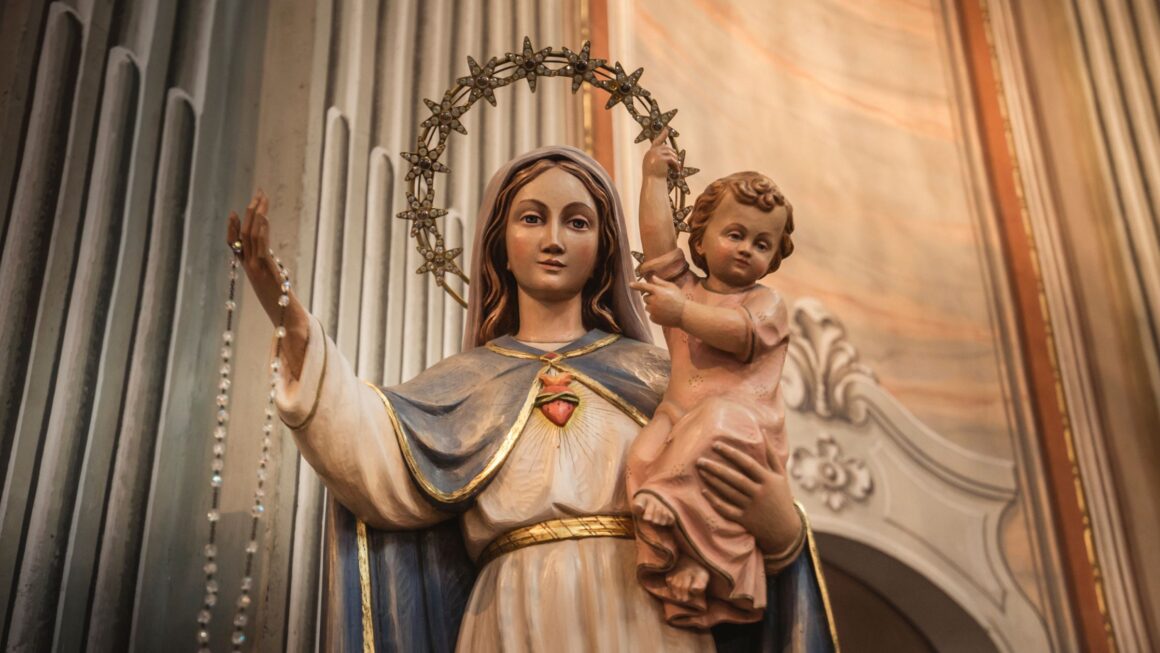A little six-year-old Protestant boy had often heard his Catholic companion reciting the prayer ‘Hail Mary.’ He liked it so much that he copied it, memorized it and would recite it every day. ‘Look, Mummy, what a beautiful prayer,’ he said to his mother one day. ‘Never again say it,’ answered the mother.’ it is a superstitious prayer of Catholics who adore idols and think Mary a goddess. After all, she is a woman like any other. Come on, take this Bible and read it. It contains everything that we are bound to do and have to do.’
From that day on the little boy discontinued his daily ‘Hail Mary’ and gave himself more time to reading the Bible instead. One day, while reading the Gospel, he came across the passage about the Annunciation of the Angel to Our Lady. Full of joy, the little boy ran to his mother and said: ‘Mummy, I have found the ‘Hail Mary’ in the Bible which says: ‘Hail Mary full of grace, the Lord is with thee, blessed art thou amongst women. ‘ Why do you call it a superstitious prayer?’
On another occasion he found that beautiful Salutation of St. Elizabeth to The Virgin Mary and the wonderful canticle. MAGNIFICAT in which Mary foretold that ‘the generations would call her blessed.’ He said no more about it to his mother but started to recite the ‘Hail Mary’ every day as before. He felt pleasure in addressing those charming words to the Mother of Jesus, our Savior.
When he was fourteen, he one day heard a discussion on Our Lady among the members of his family. Every one said that Mary was a common woman like any other woman. The boy, after listening to their erroneous reasoning, could not bear it any longer, and full of indignation, he interrupted them, saying: ‘Mary is not like any other children of Adam, stained with sin. No! The Angel called her FULL OF GRACE AND BLESSED AMONGST WOMEN. Mary is the Mother of Jesus Christ and consequently Mother of God. There is no higher dignity to which a creature can be raised.
The Gospel says that the generations will proclaim her blessed and you are trying to despise her and look down on her. Your spirit is not the Spirit Of the Gospel or of the Bible which you proclaim to be the foundation of the Christian religion.’ So deep was the impression which the boy’s talk had made that his mother many times cried out sorrowfully: ‘Oh my God! I fear that this son of mine will one day join the Catholic religion, the religion of Popes!’ And indeed, not very long afterwards, having made a serious study of both Protestantism and Catholicism, the boy found the latter to be the only true religion and embraced it and became one of its most ardent apostles.
Some time after his conversion, he met his married sister who rebuked his and said indignantly: ‘You little know how much I love my children. Should any one of them desire to become a Catholic, I would sooner pierce his heart with a dagger than allow him to embrace the religion of the Popes!’ Her anger and temper were as furious as those of St. Paul before his conversion. However, she would change her ways, just as St. Paul did on his way to Damascus.
Please consider supporting us with a PayPal donation
It so happened that one of her sons fell dangerously ill and the doctors gave up hope of recovery. Her brother then approached, her and spoke to her affectionately, saying: ‘My dear sister, you naturally wish to have your child cured. Very well, then, do what I ask you to do. Follow me, let us pray one ‘Hail Mary’ and promise God that, if your son recovers his health, you would seriously study the Catholic doctrine, and should you come to the conclusion that Catholicism is the only true religion, you would embrace it no matter what the sacrifices may be.’
His sister was somewhat reluctant at the beginning but as she wished for her son’s recovery. She accepted her brother’s proposal and recited the ‘Hail Mary’ together with him. The next day her son was completely cured! The mother fulfilled her promise and she studied the Catholic doctrine. After long preparation she received Baptism together with her family, thanking her brother for being an apostle to her.
*The story was related during a sermon given by the Rev. Father Tuckwell. ‘Brethren, he went on and said, ‘The boy who became a Catholic and converted his sister to Catholicism dedicated his whole life to the service of God. He is the priest who is speaking to you now!
What I am I owe to Our Lady. You, too, my dear brethren, be entirely dedicated also to Our Lady and never let a day pass without saying the beautiful prayer, ‘Hail Mary’, and your Rosary. Ask her to enlighten the minds of Protestants who are separated from the true Church of Christ founded on the Rock (Peter) and ‘against whom the gates of hell shall never prevail.’
By Stephen K. Ray
Why is the “Hail Mary” considered a powerful prayer in Catholicism?
The “Hail Mary” is considered a powerful prayer in Catholicism because it is a direct quote from the Bible, specifically from the Gospel of Luke 1:28 and 1:42. The Angel Gabriel greets Mary with the words, “Hail, full of grace, the Lord is with thee,” and Elizabeth, filled with the Holy Spirit, exclaims to Mary, “Blessed art thou amongst women, and blessed is the fruit of thy womb.” The prayer is a recognition of Mary’s unique role in God’s plan of salvation, her fullness of grace, and her blessedness among all women. It is a prayer of intercession, asking Mary, the Mother of God, to pray for us sinners now and at the hour of our death (cf. John 19:26-27).
How does the Catholic Church view Mary in relation to other women?
The Catholic Church holds Mary in high regard, not as a goddess, but as the Mother of God (Theotokos), a title affirmed at the Council of Ephesus in 431 AD. Mary is seen as “full of grace” (Luke 1:28) and “blessed among women” (Luke 1:42). She is the New Eve, who by her obedience untied the knot of disobedience caused by the first Eve (cf. 1 Corinthians 15:22). She is also the Ark of the New Covenant, carrying Jesus Christ, the Word made flesh, in her womb (cf. Revelation 11:19-12:2). Mary’s unique role and her exemplary faith, hope, and charity are why Catholics venerate her above all other saints.
What is the significance of the Annunciation in the Catholic faith?
The Annunciation, as described in the Gospel of Luke 1:26-38, is a pivotal moment in the history of salvation. It is when the Angel Gabriel announces to Mary that she will conceive by the Holy Spirit and bear a son, Jesus, who will be the Son of God. Mary’s “yes” to God’s plan (her fiat) is a model of complete trust and obedience to God’s will. It marks the moment of the Incarnation when the Word became flesh and dwelt among us (John 1:14). The Church celebrates this event on March 25, exactly nine months before Christmas, the birth of Jesus.
How does the Catholic Church interpret the phrase “the generations will call her blessed”?
The phrase “the generations will call her blessed” comes from Mary’s Magnificat in Luke 1:48. The Catholic Church interprets this as a prophetic acknowledgement of the honor that will be given to Mary throughout all generations as the Mother of God. This has been fulfilled in the Church’s tradition of venerating Mary, celebrating her feasts, and seeking her intercession. It is a recognition of the great things God has done for her and through her in the plan of salvation (cf. Luke 1:49).
Why do Catholics believe that Mary is sinless?
Catholics believe in the dogma of the Immaculate Conception, which states that Mary was conceived without original sin. This belief is based on the Angel Gabriel’s greeting to Mary as “full of grace” (Luke 1:28), which is interpreted to mean that she was filled with God’s life and love from the moment of her conception. This unique privilege was given to Mary in view of her future role as the Mother of God. It does not mean that Mary did not need a savior; rather, she was saved in a most sublime manner by receiving the grace of salvation from the moment of her conception. This dogma was solemnly defined by Pope Pius IX in 1854.
How does the Catholic Church view conversion?
The Catholic Church views conversion as a grace-filled process of turning one’s heart and mind towards God. It involves a personal encounter with Jesus Christ, a transformation of one’s life through repentance and faith, and incorporation into the Church through the sacraments of initiation: Baptism, Confirmation, and the Eucharist (cf. Acts 2:38-42). The Church welcomes all who seek the truth and desire to live in communion with God and others according to the Gospel of Jesus Christ (cf. 1 Timothy 2:4).
What is the role of intercessory prayer in the Catholic faith?
Intercessory prayer is a fundamental aspect of the Catholic faith. It involves asking the saints in heaven, who are part of the Communion of Saints, to pray with us and for us to God. The most common form of intercessory prayer is asking for the intercession of Mary, the Mother of God, as she holds a unique place in the Communion of Saints. This practice is rooted in the understanding that the Body of Christ is one and that the saints, being perfected in love, care for their brothers and sisters on earth (cf. 1 Corinthians 12:26-27; Revelation 5:8).
How does the Catholic Church understand the phrase “Mother of God”?
The title “Mother of God” (Theotokos) was affirmed for Mary at the Council of Ephesus in 431 AD. It means that Mary is the Mother of Jesus, who is God the Son made man. This title safeguards the truth of the Incarnation: that in Jesus Christ, true God and true man are united in one Person. Mary did not give birth to Christ’s divine nature (which is eternal), but by giving birth to the Person of Jesus Christ, who is God, she is rightly called the Mother of God. This title does not imply that Mary is above God or the source of God; rather, it acknowledges her unique role in God’s plan of salvation (cf. John 1:14).
What is the significance of the Rosary in the Catholic faith?
The Rosary is a popular devotional practice in the Catholic Church that involves meditative prayer on the mysteries of the life, death, and resurrection of Jesus Christ. It is often called the “compendium of the Gospel” because it invites us to contemplate the key events of our salvation. The Rosary is also a way of joining our prayers with Mary’s perfect prayer and asking for her intercession. It is a spiritual weapon against evil and a means of obtaining graces through Mary’s intercession (cf. Revelation 12:1-6; Pope Pius IX, Ineffabilis Deus).
How does the Catholic Church understand the phrase “the gates of hell shall not prevail against it”?
The phrase “the gates of hell shall not prevail against it” comes from Matthew 16:18, where Jesus promises that His Church, built on the rock of Peter, will withstand all the assaults of evil. The Catholic Church understands this as a guarantee of the Church’s indefectibility: despite the sins and failures of her members, the Church, as the Body of Christ, will remain faithful to Christ’s teaching, worship, and structure until the end of time. It is a promise of the Holy Spirit’s guidance and protection of the Church in her mission to proclaim the Gospel and lead all people to salvation (cf. John 14:16-17).




